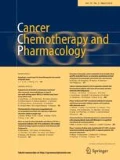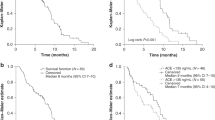Abstract
Purpose
Patients with metastatic colorectal cancer (mCRC) receiving all three active drugs (irinotecan, oxaliplatin, fluorouracil) achieve the best outcome. Bevacizumab added to chemotherapy further improves progression-free (PFS) survival and overall survival. As arterial hypertension has been reported in all studies involving bevacizumab, we retrospectively analysed the correlation between the modifications of arterial blood pressure and response rate (RR) and PFS in mCRC patients treated with bevacizumab.
Patients and methods
Patients with histologically proven mCRC receiving a first-line chemotherapeutic treatment were eligible. Arterial blood pressure was measured daily and hypertension graduated according to NCI-CTC V3.0 scale.
Results
Seventy-four patients were considered for the present analysis; median age was 57 years (range 31–80). Sixty-seven patients had undergone surgery on primary tumour and, of these, 19 patients had formerly received adjuvant chemotherapy for stage II–III tumours. Chemotherapeutic regimens for metastatic disease were FOLFIRI (61 patients), FOLFOXIRI (6 patients), XELOX (5 patients) and XELIRI (2 patients). Eighteen patients (24.3%) had basal hypertension. Thirteen patients (17.6%) developed G2–G4 arterial hypertension. Six complete (8.1%) and 31 partial (41.9%) responses were recorded. Among patients with induced arterial hypertension, 84.6% achieved a complete or partial response, as compared with 42.6% of patients who did not show this side effect (P = 0.006). Kaplan–Meier analysis showed a statistically significant improvement in median PFS for patients with induced arterial hypertension (15.1 vs. 8.3 months, P = 0.04).
Conclusions
Our data suggest that bevacizumab-related arterial hypertension may represent a predictive factor of response and prolonged PFS in patients with mCRC receiving first-line bevacizumab.

Similar content being viewed by others
References
Jemal A, Siegel R, Xu J, Ward E (2010) Cancer statistics, 2010. CA Cancer J Clin 60(5):277–300. doi:10.3322/caac.20073
Ferrara N, Hillan KJ, Gerber HP, Novotny W (2004) Discovery and development of bevacizumab, an anti-VEGF antibody for treating cancer. Nat Rev Drug Discov 3(5):391–400. doi:10.1038/nrd1381
Kabbinavar F, Hurwitz HI, Fehrenbacher L, Meropol NJ, Novotny WF, Lieberman G, Griffing S, Bergsland E (2003) Phase II, randomized trial comparing bevacizumab plus fluorouracil (FU)/leucovorin (LV) with FU/LV alone in patients with metastatic colorectal cancer. J Clin Oncol 21(1):60–65
Hurwitz H, Fehrenbacher L, Novotny W, Cartwright T, Hainsworth J, Heim W, Berlin J, Baron A, Griffing S, Holmgren E, Ferrara N, Fyfe G, Rogers B, Ross R, Kabbinavar F (2004) Bevacizumab plus irinotecan, fluorouracil, and leucovorin for metastatic colorectal cancer. N Engl J Med 350(23):2335–2342. doi:10.1056/NEJMoa032691
Saltz LB, Clarke S, Diaz-Rubio E, Scheithauer W, Figer A, Wong R, Koski S, Lichinitser M, Yang TS, Rivera F, Couture F, Sirzen F, Cassidy J (2008) Bevacizumab in combination with oxaliplatin-based chemotherapy as first-line therapy in metastatic colorectal cancer: a randomized phase III study. J Clin Oncol 26(12):2013–2019. doi:10.1200/JCO.2007.14.9930
Masi G, Loupakis F, Salvatore L, Fornaro L, Cremolini C, Cupini S, Ciarlo A, Del Monte F, Cortesi E, Amoroso D, Granetto C, Fontanini G, Sensi E, Lupi C, Andreuccetti M, Falcone A (2010) Bevacizumab with FOLFOXIRI (irinotecan, oxaliplatin, fluorouracil, and folinate) as first-line treatment for metastatic colorectal cancer: a phase 2 trial. Lancet Oncol 11(9):845–852. doi:10.1016/S1470-2045(10)70175-3
Giantonio BJ, Catalano PJ, Meropol NJ, O’Dwyer PJ, Mitchell EP, Alberts SR, Schwartz MA, Benson AB 3rd (2007) Bevacizumab in combination with oxaliplatin, fluorouracil, and leucovorin (FOLFOX4) for previously treated metastatic colorectal cancer: results from the Eastern Cooperative Oncology Group Study E3200. J Clin Oncol 25(12):1539–1544. doi:10.1200/JCO.2006.09.6305
Lyseng-Williamson KA, Robinson DM (2006) Spotlight on bevacizumab in advanced colorectal cancer, breast cancer, and non-small cell lung cancer. BioDrugs 20(3):193–195
Van Cutsem E, Rivera F, Berry S, Kretzschmar A, Michael M, DiBartolomeo M, Mazier MA, Canon JL, Georgoulias V, Peeters M, Bridgewater J, Cunningham D (2009) Safety and efficacy of first-line bevacizumab with FOLFOX, XELOX, FOLFIRI and fluoropyrimidines in metastatic colorectal cancer: the BEAT study. Ann Oncol 20(11):1842–1847. doi:10.1093/annonc/mdp233
Maitland ML (2006) Blood pressure (BP) as a biomarker for sorafenib (S), an inhibitor of the vascular endothelial growth factor (VEGF) signaling pathway. J Clin Oncol 24(18S):2035
Levy BI, Ambrosio G, Pries AR, Struijker-Boudier HA (2001) Microcirculation in hypertension: a new target for treatment? Circulation 104(6):735–740
Feihl F, Liaudet L, Waeber B, Levy BI (2006) Hypertension: a disease of the microcirculation? Hypertension 48(6):1012–1017. doi:10.1161/01.HYP.0000249510.20326.72
Ruedemann AD (1937) A micro-camera for visualization of conjunctival vessels. Trans Am Ophthalmol Soc 35:419–428
Sullivan JM, Prewitt RL, Josephs JA (1983) Attenuation of the microcirculation in young patients with high-output borderline hypertension. Hypertension 5(6):844–851
Serne EH, Gans RO, ter Maaten JC, Tangelder GJ, Donker AJ, Stehouwer CD (2001) Impaired skin capillary recruitment in essential hypertension is caused by both functional and structural capillary rarefaction. Hypertension 38(2):238–242
Slamon DJ, Leyland-Jones B, Shak S, Fuchs H, Paton V, Bajamonde A, Fleming T, Eiermann W, Wolter J, Pegram M, Baselga J, Norton L (2001) Use of chemotherapy plus a monoclonal antibody against HER2 for metastatic breast cancer that overexpresses HER2. N Engl J Med 344(11):783–792. doi:10.1056/NEJM200103153441101
Baselga J (2001) Herceptin alone or in combination with chemotherapy in the treatment of HER2-positive metastatic breast cancer: pivotal trials. Oncology 61(Suppl 2):14–21
Di Fiore F, Blanchard F, Charbonnier F, Le Pessot F, Lamy A, Galais MP, Bastit L, Killian A, Sesboue R, Tuech JJ, Queuniet AM, Paillot B, Sabourin JC, Michot F, Michel P, Frebourg T (2007) Clinical relevance of KRAS mutation detection in metastatic colorectal cancer treated by Cetuximab plus chemotherapy. Br J Cancer 96(8):1166–1169. doi:10.1038/sj.bjc.6603685
Susman E (2004) Rash correlates with tumour response after cetuximab. Lancet Oncol 5(11):647
Karapetis CS, Khambata-Ford S, Jonker DJ, O’Callaghan CJ, Tu D, Tebbutt NC, Simes RJ, Chalchal H, Shapiro JD, Robitaille S, Price TJ, Shepherd L, Au HJ, Langer C, Moore MJ, Zalcberg JR (2008) K-ras mutations and benefit from cetuximab in advanced colorectal cancer. N Engl J Med 359(17):1757–1765. doi:10.1056/NEJMoa0804385
Lievre A, Bachet JB, Le Corre D, Boige V, Landi B, Emile JF, Cote JF, Tomasic G, Penna C, Ducreux M, Rougier P, Penault-Llorca F, Laurent-Puig P (2006) KRAS mutation status is predictive of response to cetuximab therapy in colorectal cancer. Cancer Res 66(8):3992–3995. doi:10.1158/0008-5472.CAN-06-0191
Orditura M, De Vita F, Galizia G, Lieto E, Vecchione L, Vitiello F, Martinelli E, Ciardiello F (2009) Correlation between efficacy and skin rash occurrence following treatment with the epidermal growth factor receptor inhibitor cetuximab: a single institution retrospective analysis. Oncol Rep 21(4):1023–1028
Klinghammer K, Knodler M, Schmittel A, Budach V, Keilholz U, Tinhofer I (2010) Association of epidermal growth factor receptor polymorphism, skin toxicity, and outcome in patients with squamous cell carcinoma of the head and neck receiving cetuximab-docetaxel treatment. Clin Cancer Res 16(1):304–310. doi:10.1158/1078-0432.CCR-09-1928
Scartozzi M, Galizia E, Chiorrini S, Giampieri R, Berardi R, Pierantoni C, Cascinu S (2009) Arterial hypertension correlates with clinical outcome in colorectal cancer patients treated with first-line bevacizumab. Ann Oncol 20(2):227–230. doi:10.1093/annonc/mdn637
Rixe O, Billemont B, Izzedine H (2007) Hypertension as a predictive factor of Sunitinib activity. Ann Oncol 18(6):1117. doi:10.1093/annonc/mdm184
Wick A, Schafer N, Dorner N, Schemmer D, Platten M, Bendszus M, Wick W (2010) Arterial hypertension and bevacizumab treatment in glioblastoma: no correlation with clinical outcome. J Neurooncol 97(1):157–158. doi:10.1007/s11060-009-0003-5
Miles DW, Chan A, Dirix LY, Cortes J, Pivot X, Tomczak P, Delozier T, Sohn JH, Provencher L, Puglisi F, Harbeck N, Steger GG, Schneeweiss A, Wardley AM, Chlistalla A, Romieu G (2010) Phase III study of bevacizumab plus docetaxel compared with placebo plus docetaxel for the first-line treatment of human epidermal growth factor receptor 2-negative metastatic breast cancer. J Clin Oncol 28(20):3239–3247. doi:10.1200/JCO.2008.21.6457
Reck M, von Pawel J, Zatloukal P, Ramlau R, Gorbounova V, Hirsh V, Leighl N, Mezger J, Archer V, Moore N, Manegold C (2009) Phase III trial of cisplatin plus gemcitabine with either placebo or bevacizumab as first-line therapy for nonsquamous non-small-cell lung cancer: AVAiL. J Clin Oncol 27(8):1227–1234. doi:10.1200/JCO.2007.14.5466
Robert NJ, Dieras V, Glaspy J, Brufsky A, Bondarenko I, Lipatov O, Perez E, Yardley D, Zhou X, Phan S (2009) RIBBON-1: randomized, double-blind, placebo-controlled, phase III trial of chemotherapy with or without bevacizumab (B) for first-line treatment of HER2-negative locally recurrent or metastatic breast cancer (MBC). J Clin Oncol 27:15s (suppl; abstr 1005)
Escudier B, Bellmunt J, Negrier S, Bajetta E, Melichar B, Bracarda S, Ravaud A, Golding S, Jethwa S, Sneller V (2010) Phase III trial of bevacizumab plus interferon alfa-2a in patients with metastatic renal cell carcinoma (AVOREN): final analysis of overall survival. J Clin Oncol 28(13):2144–2150. doi:10.1200/JCO.2009.26.7849
Hurwitz H, Douglas PS, Middleton JP, Sledge GW, Johnson DH, Reardon DA, Chen D, Rosen O (2010) Analysis of early hypertension (HTN) and clinical outcome with bevacizumab (BV). J Clin Oncol 28:15s (suppl: abstr 3039)
Grothey A, Sugrue MM, Purdie DM, Dong W, Sargent D, Hedrick E, Kozloff M (2008) Bevacizumab beyond first progression is associated with prolonged overall survival in metastatic colorectal cancer: results from a large observational cohort study (BRiTE). J Clin Oncol 26(33):5326–5334. doi:10.1200/JCO.2008.16.3212
Yang JC, Haworth L, Sherry RM, Hwu P, Schwartzentruber DJ, Topalian SL, Steinberg SM, Chen HX, Rosenberg SA (2003) A randomized trial of bevacizumab, an anti-vascular endothelial growth factor antibody, for metastatic renal cancer. N Engl J Med 349(5):427–434. doi:10.1056/NEJMoa021491
Author information
Authors and Affiliations
Corresponding author
Additional information
A. De Stefano and C. Carlomagno equally contributed to this work.
Rights and permissions
About this article
Cite this article
De Stefano, A., Carlomagno, C., Pepe, S. et al. Bevacizumab-related arterial hypertension as a predictive marker in metastatic colorectal cancer patients. Cancer Chemother Pharmacol 68, 1207–1213 (2011). https://doi.org/10.1007/s00280-011-1604-1
Received:
Accepted:
Published:
Issue Date:
DOI: https://doi.org/10.1007/s00280-011-1604-1




